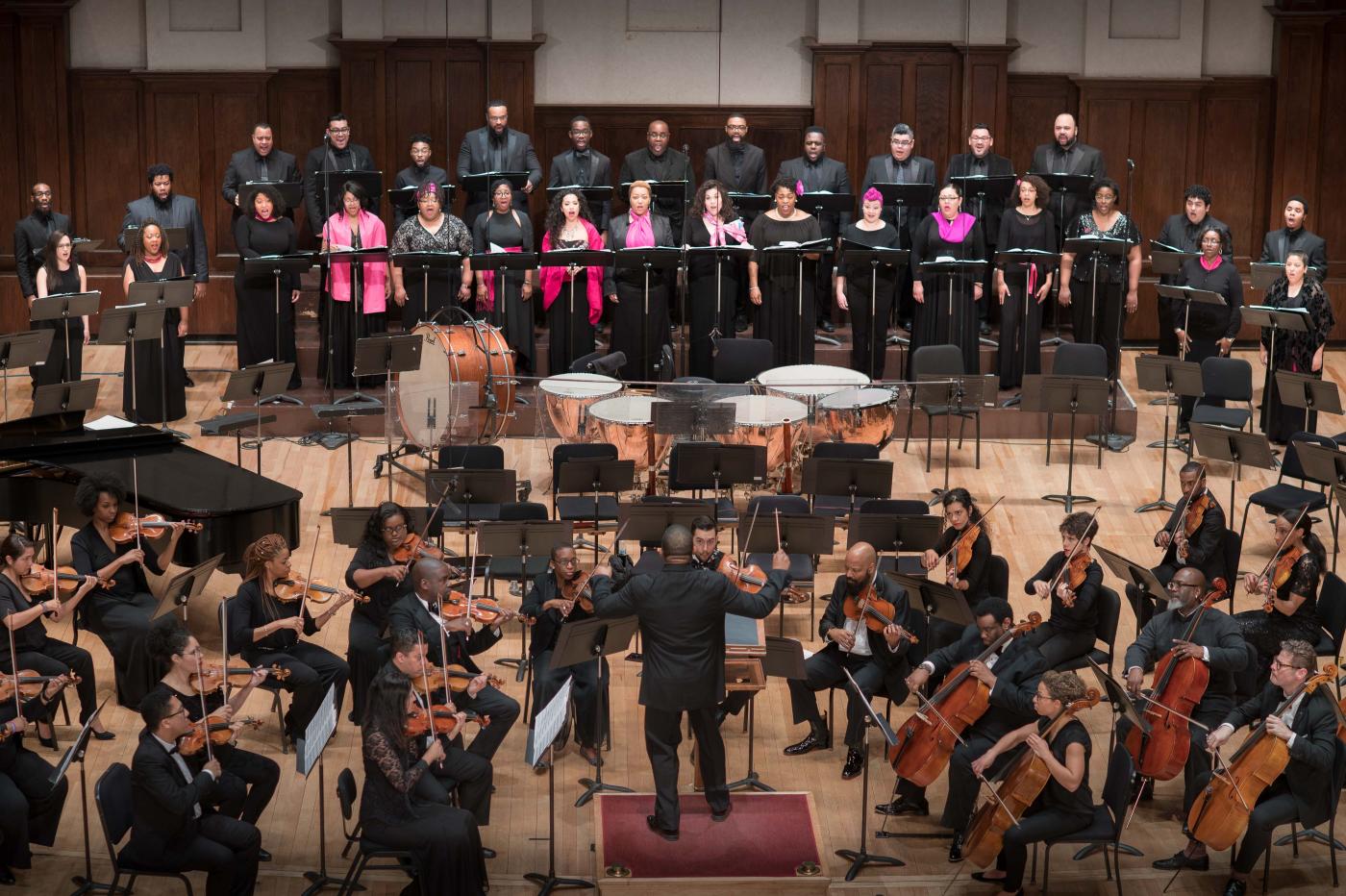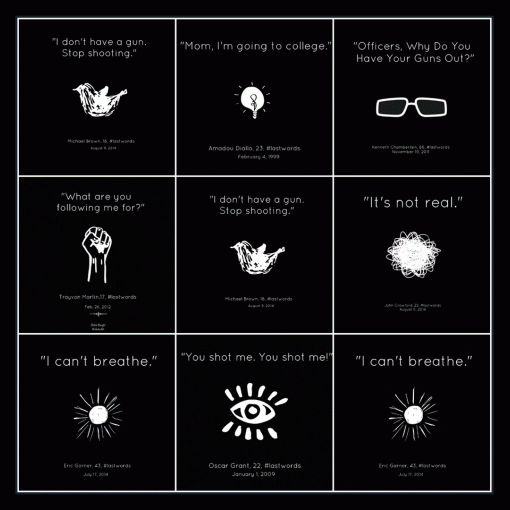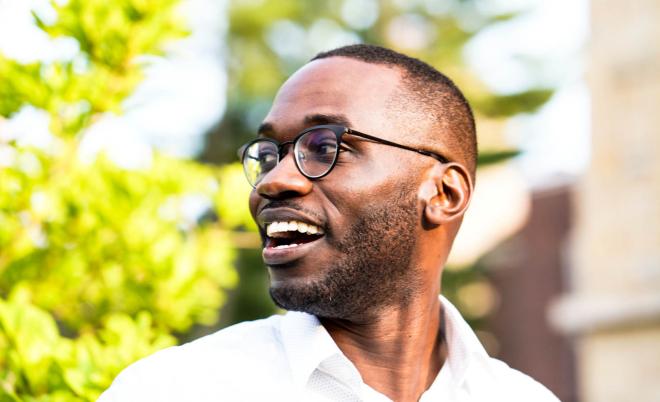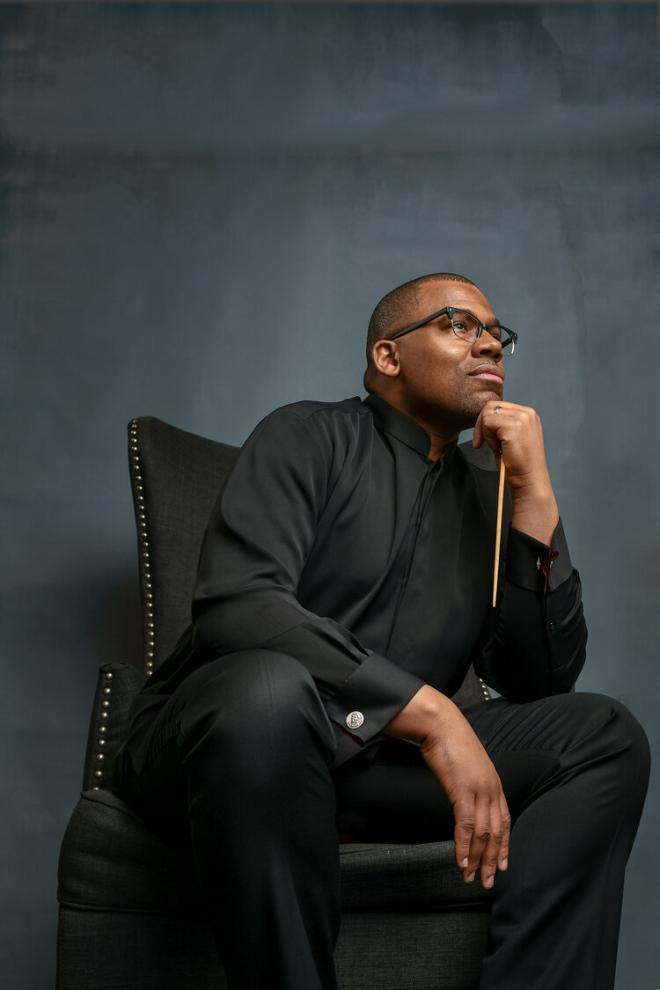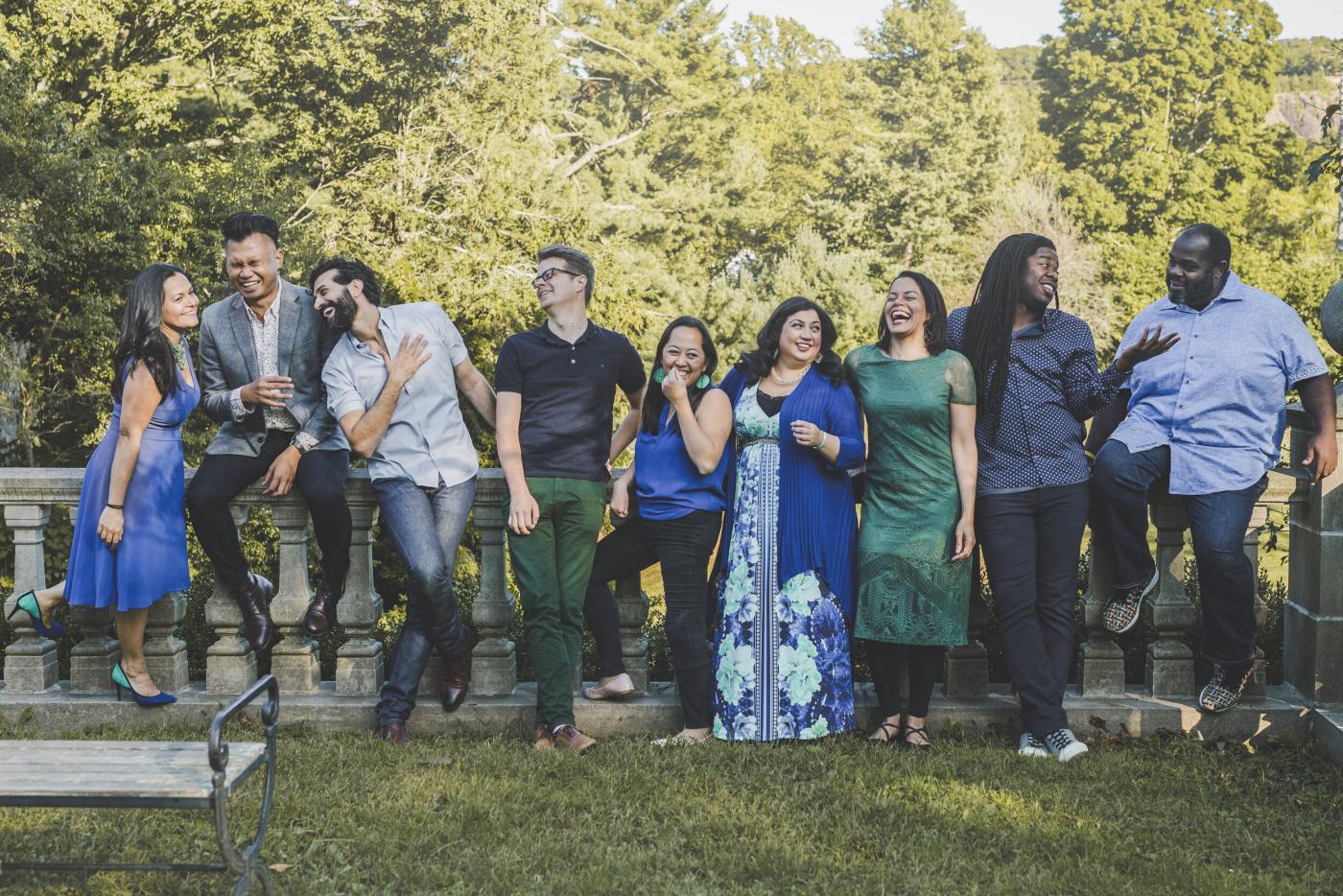On Tuesday, January 31, Tito Muñoz and Dr. Eugene Rogers will conduct the Sphinx Symphony Orchestra, the EXIGENCE Vocal Ensemble and members of the Washington Chorus in a performance at the Kennedy Center, a co-presentation between The Kennedy Center and Washington Performing Arts in partnership with The Washington Chorus. The Sphinx Symphony and EXIGENCE are both programs of the Detroit-based Sphinx Organization, now in its 25th year; its mission is to grow the representation of Black and Latinx artists in classical music, equip and empower Latinx and Black artists — from students to professionals — to thrive in classical music performance, and to educate and enliven music lovers of every background.
The January 31 program includes a piece by this season’s Kennedy Center Composer-in-Residence Carlos Simon commissioned by the Sphinx Organization, Seven O’Clock Shout by Valerie Coleman, and a work by Joel Thompson, Seven Last Words of the Unarmed.
Thompson’s work, scored for men’s voices and orchestra, sets the last known words of seven Black men who were killed, unarmed — most of them by police officers: Michael Brown, Trayvon Martin, Oscar Grant, Eric Garner, Kenneth Chamberlain, Amadou Diallo and John Crawford. Composed in four weeks in the winter of 2014 after the police officers who killed Eric Garner were acquitted, Thompson looked deeply into the lives and deaths of these seven men to create this musical testimony. Seven Last Words of the Unarmed was first performed in 2015 by the University of Michigan School of Music; this performance was also featured in a 2016 documentary.
In an April 2016 interview with Cynthia Canty on Michigan Radio’s Stateside, Thompson remarked, “I wrote the piece without the intention of it really being performed; it was really a method for me to process my own feelings and sort of exorcise the emotions in a healthy way.” Yet the work has indeed been performed — such as by the Tallahassee Symphony, the University of Nebraska at Omaha, and the Minnesota Orchestra.
I reached out to Thompson to ask him about the work and its upcoming performance at the Kennedy Center.
Evan Keely: You’ve commented on the title of this piece, its evocation of the tradition of the Seven Last Words of Christ and the many musical settings of this devotional and liturgical set of texts (Joseph Haydn’s being among the more memorable). Can you tell us more about this title?
Joel Thompson: By referencing a liturgical template that asks congregations to focus on the humanity and suffering of Jesus, I hope to make clear that Seven Last Words of the Unarmed is similarly a meditation on the humanity of seven unarmed Black men who were murdered by authority figures. The piece was an attempt to combat the feelings of worthlessness I felt in the wake of Eric Garner’s murder and the lack of accountability that followed. In focusing on his humanity and that of the other men who met the same fate, I was hoping to hold on to my own. I hope the title of the piece clarifies its intent.
EK: One of the many things I appreciate about this work is its emotional breadth. Certainly it expresses the rage, horror and anguish of this devastating subject — such as in the taught fourth movement, barely a full minute long, with its jagged rhythms for Michael Brown’s “I don’t have a gun — stop shooting!”; the instruction in your score for the vocalists to slap their hands on their chests while voicing Oscar Grant’s astonished, “You shot me!” Yet this piece is also infused with beauty, longing and even sweetness, such as the serene, beatifically hopeful third movement, setting Diallo’s last message to his mother, “Mom, I’m going to college” (the only vocal solo in the whole work), or the kind of dreamlike, almost delirious atmosphere you give to John Crawford’s “It’s not real” (referring to the pellet gun he had been holding moments before police officers fatally shot him in a store in open-carry Ohio). As we’re listening to the whole piece, what do you want audiences to understand about your own journey with pondering these seven lives and deaths, and what you are trying to express about them in your music?
JT: I’m glad you find emotional breadth in this work! I’m always afraid that the piece is too heavy because I never balance the dark with light, since I never intended for the piece to be heard in the first place. It was a diary entry for my own healing process. Therefore, my journey with these men and their stories is in the music itself, but I’d rather audiences focus on the men themselves and their humanity. Shirin Barghi’s artwork in her #lastwords pictogram series on Twitter was also an inspiration for the piece. By pairing a simple image with the last words of Black people killed during interactions with police, Barghi urges us to see them as fellow human beings, which is in direct contrast to a lot of other media that seemed to dehumanize them in the wakes of their deaths in order to justify their murders. In the end, I want audience members to see themselves in these men as I did.
EK: I notice that in some performances, the choristers and sometimes even the instrumentalists are performing from memory. Is this something you’ve requested or encouraged?
JT: While it is not something I’ve specifically requested, I’m always grateful to see ensembles take that extra step of internalizing these last words in this musical context. It makes for a more effective performance. I know that the brilliant Dr. Eugene Rogers, who premiered the work with the University of Michigan Men’s Glee Club, has requested that his ensembles memorize it for performance and I think that it aligns with his philosophy of “speaking the truth from the stage.” I also think there is a practical reason for memorization: the fifth movement is a bit kinesthetic in nature — holding folders and hitting the chest at the same time can be a bit cumbersome — so memorization removes the use of choral folders and makes the movement more earnest and organic in performance.
EK: The concert at the Kennedy Center will not be the first time the Sphinx Organization has performed this work; that was in 2017, for their 20th anniversary, when they commissioned you to create an orchestral version that expands the original chamber ensemble scoring. Please tell us more about your ongoing relationship with Sphinx.
JT: The Sphinx Organization played an integral role in starting my compositional career. Andre Dowell, their current Chief of Artist Engagement, was present at the premiere of Seven Last Words of the Unarmed in 2015 and almost immediately requested an orchestrated version of the work for the Sphinx 20th anniversary. SLW was my Op. 1 (my first published piece) and I’d never written for a full symphony orchestra at that point. Looking back over the last eight years and the various opportunities I’ve had to write for several orchestral ensembles, I can’t help but feel an enormous sense of gratitude for the Sphinx Organization for their trust in my artistry and their amplification of my voice. In March, I’ll be awarded the Sphinx Medal of Excellence alongside soprano Aundi Marie Moore and cellist Thomas Mesa.
EK: You’ve lived in the Caribbean and in Atlanta (you’re an Emory alumnus), and your work as a composer has taken you to many different places, including Aspen and Yale. How do your life experiences shape you as a composer? What are some of your influences?
JT: I’ve always thought of music not just as a method of self-expression but also as an avenue for self-exploration. When viewed through that lens, I find that composition leads to moments of self-discovery for me. My rubric for a successful composition doesn’t prioritize applause or kind reviews in its metrics; I prefer to focus on how much I’ve grown or revealed to myself in the creative process. Beyond that, there are several foundational elements of my experience — my Jamaican parents, my experience as a church musician, my youthful desire to be a doctor, to name a few — that are present in everything I write. I try not to limit myself aesthetically and I try to take risks without losing a sense of groundedness so that my loved ones without music degrees can still have access to my expression. I try to facilitate the cycle of music creating community and community creating music in my craft on and off the page as I’ve learned from making music in places of worship. And all of that is undergirded by a desire to create spaces of healing, even though music operates in a more spiritual and emotional realm than the physical realm of medicine. My love of various artists and their work also finds its way into my expression. J.S. Bach, S. Rachmaninoff, S. Barber, N. Simone, E. Spalding, C.M. Salvant all inspire, challenge, soothe, and thrill me with their art.
EK: What other works of yours do you want us to know about and hear?
JT: One of my favorite pieces is one I wrote for the Yale Glee Club, the Morse Chorale, and the Kaleidoscope Vocal Ensemble during the pandemic called A Prayer for Deliverance. Also, the amazing tenor Lawrence Brownlee is starting a recital tour with pianist Kevin Miller in a few months and they’re performing a setting of Langston Hughes called My People alongside songs by some of my favorite composers today like Jasmine Barnes and Shawn Okpebholo.
EK: Looking to the future, what are some compositions you’re now working on (or hoping to be) that you want us to know about?
JT: As composer in residence at Houston Grand Opera, I’m excited to be working on a full-length opera for their 2026-27 season. They’re also supporting me in smaller projects in the next five years of my residency there, and I’m so grateful to Khori Dastoor, Patrick Summers, and Jeremy Johnson for their leadership and vision in facilitating this fruitful and life-changing artistic relationship. I’m also collaborating with Russell Thomas and Imani Tolliver on a large work for tenor and orchestra in conjunction with Russell’s residency with LA Opera.
PBS PASSPORT
Stream tens of thousands of hours of your PBS and local favorites with WETA+ and PBS Passport whenever and wherever you want. Catch up on a single episode or binge-watch full seasons before they air on TV.
